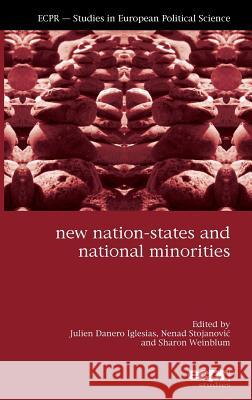New Nation-States and National Minorities » książka
New Nation-States and National Minorities
ISBN-13: 9781907301360 / Angielski / Twarda / 2013 / 294 str.
New Nation-States and National Minorities
ISBN-13: 9781907301360 / Angielski / Twarda / 2013 / 294 str.
(netto: 469,01 VAT: 5%)
Najniższa cena z 30 dni: 491,10
ok. 16-18 dni roboczych.
Darmowa dostawa!
The twentieth century saw the emergence of new states shaped on the classic nation-state model. How has this model been moulded and implemented? What have been the implications for minorities in these new nation-states? And how have minorities responded to nationalising processes? Following a discussion by Rogers Brubaker of his concept of nationalising state, contributions to this volume examine the dynamic relations between national minorities and nation-states established in the course of the last century, including Ukraine, Moldova, Turkey, Malaysia and Israel. This book's original theoretical framework and comparative approach offer a new understanding of the complex interactions between the formulation of a state identity and the aspirations of those who do not fit in the proclaimed core nation. In light of recent developments in ‒ notably ‒ Ukraine and Israel, this book is essential reading for all those interested in the rights and protection of national minorities and, more broadly, in the debates over the definition of the polity in a tense environment.
The twentieth century has seen the emergence of new states shaped on the classic nation-state model. What have been the implications for minorities in these new nation-states? How have minorities responded to nationalising processes generated by the states self-definition? In order to answer these two questions the book offers an innovative perspective on the complex interactions between national minorities and newly established nation-states. Starting with a novel discussion by Rogers Brubaker of his concept of nationalising state, the authors of the book further discuss this model by using a large array of diverse cases such as Moldova, Ukraine, Turkey, Malaysia and Israel. These contributions shed light on common trends in relation to state-building processes, citizenship, rights of national minorities and their mobilisation. The original theoretical framework, combined with a comparative approach, challenges our understanding of these crucial issues."A group of young scholars, under the intellectual patronage of Rogers Brubaker, have undertaken the challenging task of disentangling the complex relationships between newly nationalising states and their national minorities, mainly in Eastern and Central Europe, but also beyond (Malaysia, Israel, Turkey...). The result is a well researched book, theoretically informed, which sheds refreshing light on state-building processes, minorities mobilisation and inter-group relations."Alain Dieckhoff, Senior Research Fellow, CNRS, Sciences Po Paris "This volume brings together well researched case studies which explain when and how nationalism begins to matter. Nationalism and group belonging are not taken for granted, but explored as political processes that display similarities from Southeast Asia to Poland. The contribution of this volume is to explore the relationship between nation-states and minorities as dynamic process."Florian BieberProfessor of Southeast European Studies, University of Graz











